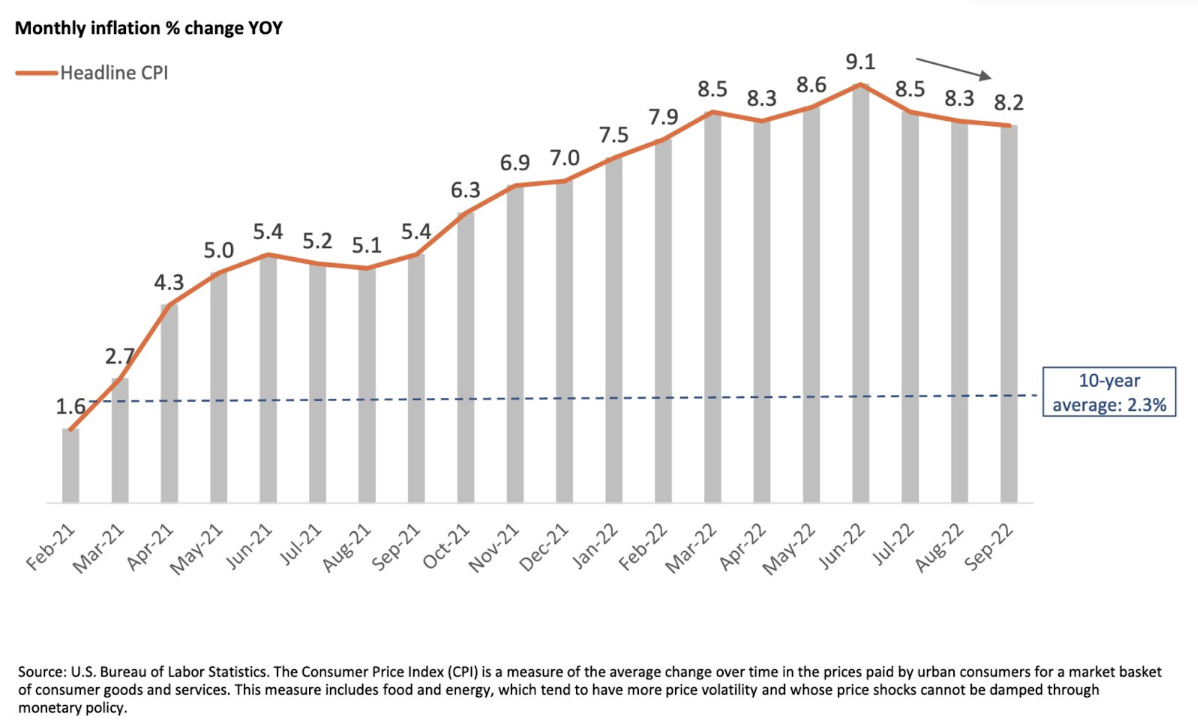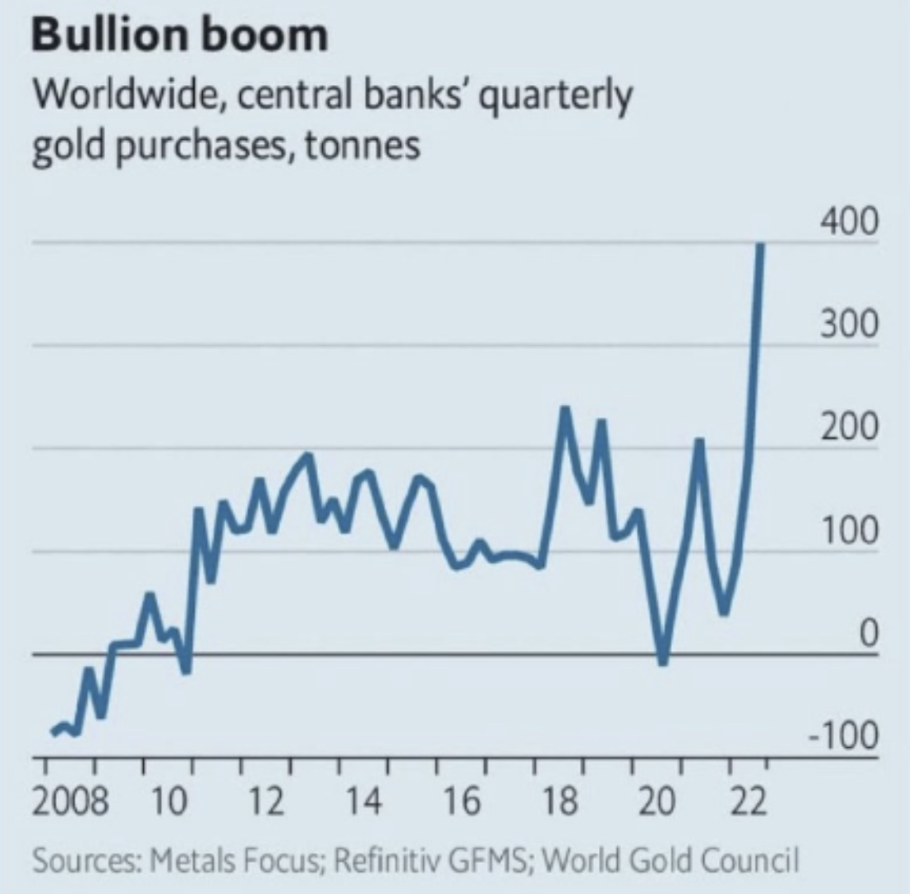The last time I wrote about the case for gold was in April 2021. At the time gold was in the range of USD 1700, and as of December 10, 2022, it now approaches USD 1800.
You may consider this to be an unstellar performance, and the author to be in an incurable gold bug. Before jumping to these conclusions, consider the following:
1, The war against inflation may already be lost.
Inflation remains uncontrolled and real interest rates remain strongly negative. European Central Bank Chairwoman Lagarde recently stated that even a recession won’t be sufficient to cure inflation. In the US, monetary tightening has had only a minimal effect on reducing inflation:
Negative real interest rates remain rampant throughout the world. Loss of purchasing power exceeds interest on savings. Holding bonds or savings accounts is illogical behavior unless one believes that inflation will come down relatively soon. As it becomes increasingly apparent that this is not the case, and negative real interest rates will remain for the foreseeable future, the trickle towards gold may become a stampede.
2, Central Banks are accumulating record amounts of gold.
Alan Greenspan, former Chairman of the US Fed once said: “I view gold as the primary global currency. It is the only currency, along with silver, that does not require a counterparty signature.” Central banks’ accumulation of gold is a possible indication that they wish to hedge against a possible upcoming financial crisis, and that they are less keen on the US dollar as a reserve currency.

3, Bitcoin, considered by many as a competitor or substitute for gold, has been decimate
Bitcoin has, in a short time, collapsed from ca. USD 60,000 to ca. USD 17,000. Many bitcoin exchanges have been hacked or have collapsed. Allegations of fraud abound. Who in the world will consider holding their savings in bitcoin? Surprisingly, there remain a few die-hards. My own opinion is that bitcoin will never recover the level of confidence previously enjoyed and gold will take on a new luster. Gold may seem a bit old fashioned—sure, it has a track record of several thousand of years.
4, Geopolitical tensions in the world are considerably higher.
US General Mattis recently stated to a gathering of 2700 CEO’s: “We are living in a period of stability compared to what is coming.” There are just so many pressure points in the world today beyond Ukraine—from Taiwan to the Middle East. Putin has not finished escalating. He has recently made statements about the likelihood of nuclear war increasing and that Russia has incorporated pre-emptive nuclear strike into its military strategy. The rise of China puts it on a potential collision course with the US.
Gold is a natural refuge in times of geopolitical tension and war.
5, The world is well-positioned for not just a recession, but a full-blown financial crisis.
Over 50 emerging countries are facing the risk of financial crisis, according to the UN.
How will the US service 32 trillion dollars of debt at 5% when total tax revenues are in the range of $3-4 trillion?
Given that high leverage equates to financial instability—and global leverage is off-the-charts– people are losing confidence in the Fed’s inflation narrative and in the value of fiat currencies. Having at least a percentage of one’s wealth in gold seems to be an increasingly logical choice. There is no safe haven in times of crisis: while gold may fall when the bottom falls out of financial markets, it tends to fall less and recover quicker.
This article should not be construed as financial advice. The above underlying market forces are at play, but no economist can predict when gold will make its move. Gold as a small percentage of one’s portfolio—whether for an individual or pension fund—seems to be an increasingly logical hedge.
As George Bernard Shaw once wrote: “You have to choose between trusting to the natural stability of gold and the … honesty and intelligence of the members of government. And with due respect to these, gentlemen, I advise you, as long as the capitalist system lasts, to vote for gold.”
- a, Relative to just about every other asset class (e.g. debt and equities each down 20 or so percent over the time horizon), this is not a bad performance!
- b, When you consider that over the same time horizon, the US Dollar has strengthened considerably, gold’s performance is even more remarkable. Measured in every non-dollar currency, gold’s performance has been strong.
- c, While in April 2021, I talked of underlying market forces possibly pushing up the value of gold, I was never brave (or foolish) enough to forecast when such a major upward valuation in gold might occur. It seems that underlying market forces are even stronger today, which will be the subject of this article.
1, The war against inflation may already be lost.
Inflation remains uncontrolled and real interest rates remain strongly negative. European Central Bank Chairwoman Lagarde recently stated that even a recession won’t be sufficient to cure inflation. In the US, monetary tightening has had only a minimal effect on reducing inflation:

Negative real interest rates remain rampant throughout the world. Loss of purchasing power exceeds interest on savings. Holding bonds or savings accounts is illogical behavior unless one believes that inflation will come down relatively soon. As it becomes increasingly apparent that this is not the case, and negative real interest rates will remain for the foreseeable future, the trickle towards gold may become a stampede.
2, Central Banks are accumulating record amounts of gold.
Alan Greenspan, former Chairman of the US Fed once said: “I view gold as the primary global currency. It is the only currency, along with silver, that does not require a counterparty signature.” Central banks’ accumulation of gold is a possible indication that they wish to hedge against a possible upcoming financial crisis, and that they are less keen on the US dollar as a reserve currency.

3, Bitcoin, considered by many as a competitor or substitute for gold, has been decimate
Bitcoin has, in a short time, collapsed from ca. USD 60,000 to ca. USD 17,000. Many bitcoin exchanges have been hacked or have collapsed. Allegations of fraud abound. Who in the world will consider holding their savings in bitcoin? Surprisingly, there remain a few die-hards. My own opinion is that bitcoin will never recover the level of confidence previously enjoyed and gold will take on a new luster. Gold may seem a bit old fashioned—sure, it has a track record of several thousand of years.
4, Geopolitical tensions in the world are considerably higher.
US General Mattis recently stated to a gathering of 2700 CEO’s: “We are living in a period of stability compared to what is coming.” There are just so many pressure points in the world today beyond Ukraine—from Taiwan to the Middle East. Putin has not finished escalating. He has recently made statements about the likelihood of nuclear war increasing and that Russia has incorporated pre-emptive nuclear strike into its military strategy. The rise of China puts it on a potential collision course with the US.
Gold is a natural refuge in times of geopolitical tension and war.
5, The world is well-positioned for not just a recession, but a full-blown financial crisis.
Over 50 emerging countries are facing the risk of financial crisis, according to the UN.
How will the US service 32 trillion dollars of debt at 5% when total tax revenues are in the range of $3-4 trillion?
Given that high leverage equates to financial instability—and global leverage is off-the-charts– people are losing confidence in the Fed’s inflation narrative and in the value of fiat currencies. Having at least a percentage of one’s wealth in gold seems to be an increasingly logical choice. There is no safe haven in times of crisis: while gold may fall when the bottom falls out of financial markets, it tends to fall less and recover quicker.
This article should not be construed as financial advice. The above underlying market forces are at play, but no economist can predict when gold will make its move. Gold as a small percentage of one’s portfolio—whether for an individual or pension fund—seems to be an increasingly logical hedge.
As George Bernard Shaw once wrote: “You have to choose between trusting to the natural stability of gold and the … honesty and intelligence of the members of government. And with due respect to these, gentlemen, I advise you, as long as the capitalist system lasts, to vote for gold.”